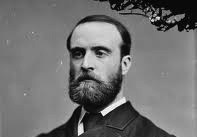
The man known as the ‘Uncrowned King of Ireland’ was born on June 27th, 1846, 165 years ago today.
The Great Famine of 1845 to 1849 left over 1 million dead with a further 1 million emigrating over the following 10 years. One of the effects of the disaster was to demonstrate to ordinary Irish people that the English Government had failed them in their time of need and that they must seize control of their own destiny.
Out of the Famine grew several revolutionary movements which culminated in the 1916 Easter Rising. In the second half of the nineteenth century the main concern of the Irish people was their land and the fact that they had no control whatsoever over it ownership.
Charles Stewart Parnell was the son of a Protestant landowner who organised the rural masses into agitation against the ruling Landlord class to seek the 3 Fs: Fixity of Tenure, Freedom to Sell and Fair Rent.
Violence flared in the countryside but Parnell preferred to use parliamentary means to achieve his objectives and the result was a series of Land Acts which greatly improved the conditions under which the Irish agricultural class toiled.
Parnell’s main ambition was Home Rule for Ireland (local Government) and he led the Irish Party, deposing Isaac Butt in the process to achieve this aim. He and colleagues such as Joseph Biggar made a science out of ‘fillibustering’ and delayed the English parliament by introducing amendments to every clause of every Bill and then discussing each aspect at length. His popularity in Ireland soared to great heights.
Speaking at Ennis on 19 September 1880, Parnell declared : “When a man takes a farm from which another had been evicted you must shun him on the roadside when you meet him, you must shun him in the streets of the town, you must shun him in the shop, you must shun him in the fairgreen and in the marketplace, and even in the place of worship, by leaving him alone, by putting him in a moral Coventry, by isolating him from the rest of his country as if he were the leper of old, you must show your detestation of the crime he has committed”.
This type of “moral Coventry” was used in the cast of Captain Boycott, a County Mayo land agent, who was isolated by the local people until his nerve broke. This led to a new word entering in to the English language, boycotting.
Trouble loomed for Parnell however, in his private life. He had secretly courted a married woman, Kathleen O’Shea, the husband of whom filed for divorce, naming Parnell as the co-repsondent. He tried to ignore the scandal and continued his public life. Public pressure in Ireland and from Gladstone in England eventually brought his downfall and he died shortly afterwards, in 1891. The Home Rule Bill that he had forced Gladstone into introducing was passed in the House of Commons, but defeated in the House of Lords.
In his last speech in Kilkenny in 1891 he said: ‘I don’t pretend that I had not moments of trial and of temptation, but I do claim that never in thought, word, or deed, have I been false to the trust which Irishmen have confided in me’.
But perhaps he will be most remembered for the quotation that can be found on his statue at the junction of O’Connell Street and Parnell Street in Dublin City Centre:
‘No man shall have the right to fix the boundary to the march of a Nation’.
![[Irish Republican News]](https://republican-news.org/graphics/title_gifs/rn.gif)
![[Irish Republican News]](https://republican-news.org/graphics/title_gifs/harp.gif)

